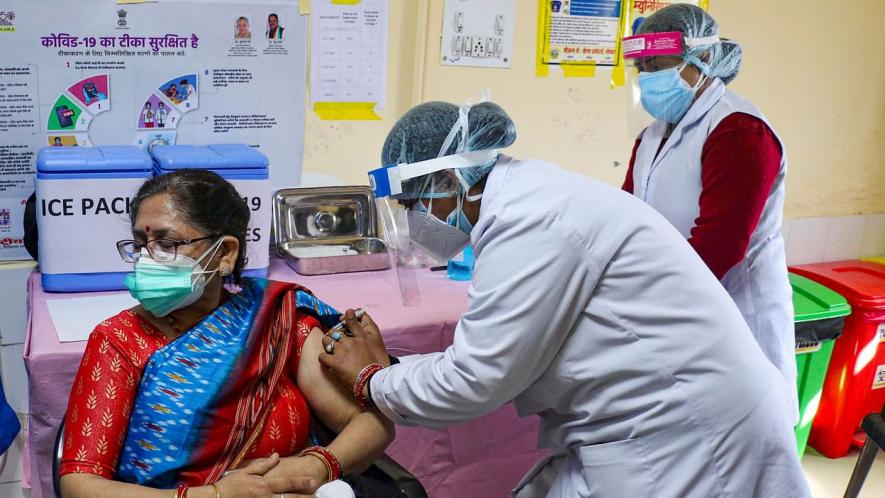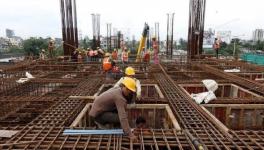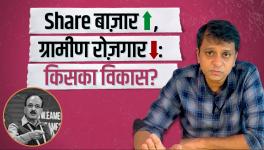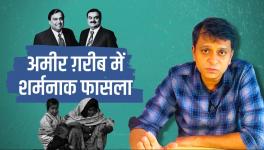Why Covid Vaccination Should be Free in India

Image Courtesy: The Quint
The policy shift of the Government of India towards deregulating vaccine prices and liberalising vaccine distribution has led to much debate. The government and the vaccine producers argue that deregulation of vaccine prices would lead to higher supply of vaccines. According to them, the entry of newer vaccines into India are contingent on whether economic incentives exist in the form of freedom to charge higher prices. It is also argued that the new policy would allow for higher levels of private participation in vaccine distribution, which would hasten the rate of vaccination in India. Both these arguments are wrong and not founded on any evidence.
There are many reasons to argue so, but I shall only highlight seven major reasons.
First, vaccines are global public goods. A “pure” public good is usually defined in economics as a non-rival and non-excludable good. However, this is not the sense in which the term is used to describe vaccines. The term is used in a different sense as to mean that vaccines should be available universally, for everyone and everywhere, and be affordable, safe, effective and easily administered.
If vaccines are to be made available in the ways described above – i.e., universal, affordable, safe, effective and easy – the most efficient and equitable method is to make them available free of cost. Free vaccination is globally accepted as a responsibility of an enlightened welfare state. This is the reason why several countries, including United States, United Kingdom, Germany, France and China have decided to vaccinate their populations free of cost. India, unfortunately, is an exception to this global trend.
Secondly, in the specific case of India, free vaccination is also a constitutional obligation of the state. Right to health is a constitutional right of every citizen and the right to free vaccines flows as a sub-set of the right to life. As such, free vaccination can be argued to be a fundamental right of every Indian citizen, which is also an idea upheld multiple times by the Supreme Court of India.
Thirdly, vaccines must be free because the research and development efforts behind the development of most vaccines are funded predominantly by governments. This is true for most vaccines developed in the past, as well as for Covid vaccines in 2020-21. In the case of the Oxford-AstraZeneca vaccine, more than 97 per cent of the research was funded by public institutions using taxpayer’s money. This included financing by the government departments of United Kingdom, scientific institutes in the United Kingdom and United States, the European Commission and various charities. For this very reason, an explicit promise was made in November 2020 that the Oxford-AstraZeneca vaccine “will be available on a non-profit basis ‘in perpetuity’ to low- and middle-income countries in the developing world”. In the case of Covishield, the Indian name of the Oxford-AstraZeneca vaccine, Adar Poonawalla had stated on 6th April 2021 that the Serum Institute of India (SII) was indeed earning a normal profit per dose at Rs 150/dose. However, he said that SII wanted super-profits per dose, which was completely at variance with the promise of provision on a non-profit basis. Now, this urge for super profits has resulted in prices shooting up from Rs 150/dose to Rs 400-600/dose.
Similarly, in the case of Pfizer’s vaccine, its partner BioNTech was the recipient of a grant of €375 million from the German government and of debt financing worth €100 million from the European Union. In the case of the Indian vaccine, Covaxin, the SARS-CoV-2 strain was isolated in the National Institute of Virology, Pune that functions under the Indian Council for Medical Research (ICMR). Bharat Biotech was only licensed to develop and manufacture the vaccine.
On their part, private vaccine producers have always attempted to conceal the public funding of vaccine development. They argue that it is private incentives that lead to the development of new vaccines. Through such a campaign, they try to create a public discourse that favours the pricing of vaccines with a high mark-up. The truth, on the other hand, is that the public has already paid for the vaccines through their tax payments. Any price for the vaccines would imply charging the public twice, which would be unethical.
Fourthly, an important constraint to universal vaccination is vaccine hesitancy, which refers to delays in acceptance or rejection of vaccines even when vaccines are available. While complacency, convenience and confidence play a complex role in creating vaccine hesitancy among people, poorer countries like India face an additional constraint: affordability. If vaccines are priced at levels that sections of the population perceive as unaffordable, they may delay vaccination or not receive it at all.
For India, let us assume that the population must pay Rs 400 per dose, or Rs 800 for two doses. A family with four adults must then pay Rs 3200 for two doses. As per official surveys, the average monthly income of an agricultural household in India in 2012-13 was Rs 6426. Taking this amount as a benchmark, the household would have to part with about 50 per cent of their monthly income to pay for vaccines. If we construct an approximate poverty line for India at Rs 50 per capita per day, the average monthly income of a household with four working adults would be Rs 6000. The cost of vaccinating four adults would amount to 53 per cent of the household’s monthly income. Millions of such households would opt out of vaccination, which would defeat the vaccination policy and ultimately endanger the overall welfare of the society. Free vaccines, in one shot, removes all affordability constraints from the problem of vaccine hesitancy.
Fifthly, even if vaccines are given free to all, the Union government has insisted that the State governments should purchase the vaccines at Rs 400/dose and meet the costs from State budgets. Let us take the size of India’s population in 2020 at 138 crore. Let us also assume that about 30 per cent of the population falls below the age of 18 years, and hence need not be vaccinated. Thus, India must vaccinate about 96.6 crore persons. At the rate of two doses per person, India needs about 193.2 crore doses. Let us also assume that the central government would anyway vaccinate 30 crore people free of cost, as it appears to have promised. Thus, deducting 60 crore doses from the target, what remains is 133.2 crore doses. At Rs 400/dose, the total cost for the State governments comes to Rs 53,280 crore.
For individual State governments, the aggregate amount they must spend to purchase vaccines from vaccine producers are surely unaffordable. State governments are already burdened with significant additional expenses to address the pandemic. They also face falling revenues and curbs on additional borrowing. Even if they borrow, States pay higher interest rates than if the centre borrows. On the other hand, for the central government, Rs 53,280 crore is an insignificant amount over a financial year, constituting just 0.26 per cent of the GDP. It would be most desirable if the central government directly spends this amount for the entire Indian population.
Sixthly, free vaccination is simple and easy to administer in a country like India. In fact, simplicity of access is an important global consideration in vaccine policy. Different prices for the same product would lead to multiple administrative layers – centre’s vaccination centres, State’s vaccination centres, private hospitals, private firms having special arrangements with private providers and so on – leading to not just complexity of administration but also creation of ample incentives for corruption. For example, one should not be surprised if the staff in the vaccination centres of States, where vaccines become available at Rs 400/dose, fudge records and sell vaccines under the table to private hospitals at Rs 600/dose. Such deals would starve public centres of vaccines and heavily discriminate against the poorer sections of the society.
Universal and free vaccination removes such incentives for corruption and keeps vaccine services simple and easy to administer. They, thus, enhance transparency guarantees and help expand the freedoms of people.
Seventhly, a vaccine market is best not fragmented. India’s new policy has kept 50 per cent of the vaccine production reserved for the centre and assigned the rest for States and private hospitals, who will pay Rs 400/dose and Rs 600/dose, respectively. With the crunch in vaccine production likely to continue till late-2021, rationing of vaccines would become essential. What criterion would be used to decide which State gets the vaccine first and how much? What would decide how much goes to States and how much goes to private hospitals? Would not private hospitals who pay Rs 600/dose be favoured by vaccine producers than States who pay only Rs 400/dose? In fact, Adar Poonawalla himself had stated as much in an interview to CNBC-TV18 on the 21st April 2021. He said:
“I don't know why there is such a hullabaloo over every State complaining about this price, because it is their option and not their compulsion…In effect, the States don't really need to buy anything if they don't want to…There are enough private hospitals to take care of each State... no State really needs to spend any of their money.”
In essence, Poonawalla was openly expressing his desire to sell more vaccines at Rs 600/dose and less vaccines at Rs 400/dose. He had earlier expressed his frustration over being forced by the government to sell vaccines at Rs 150/dose and wanted the price to be fixed at Rs 1000/dose. He also mentioned in the interview to CNBCTV18 that he had initially wanted the price for State governments too to be fixed at Rs 600/dose, but had agreed to bring it down to Rs 400/dose after certain negotiations. All these declared intentions reaffirm the fear that States may be discriminated against in favour of private hospitals in the long run.
Good public policy should avoid these pitfalls of poor design and aim for equitable distribution of vaccines across citizens and stakeholders. Free vaccination, spearheaded by a single channel of distribution from the centre to the States based on socially desirable criteria of sharing, is the best policy to follow.
(R. Ramakumar is a Professor at the Tata Institute of Social Sciences, Mumbai)
Get the latest reports & analysis with people's perspective on Protests, movements & deep analytical videos, discussions of the current affairs in your Telegram app. Subscribe to NewsClick's Telegram channel & get Real-Time updates on stories, as they get published on our website.
























